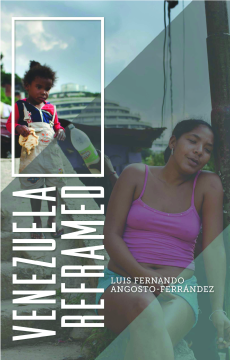
Additional Information
Book Details
Abstract
The role of the indigenous population in the formation of the Bolivarian constitution is one of Latin America’s most important untold stories.
Considered a beacon of twenty-first century socialism by many, Venezuela is witnessing the paradoxical emergence of ‘indigenous capitalisms’ as the government and various indigenous actors are driven by notions of development and enfranchisement grounded in the ideology of multiculturalism. Venezuela Reframed shows that a considerable part of indigenous activism, aligned with the Bolivarian governments, has paved the way for development in classical, social-democratic terms. It looks at how, in opposition to sectors of the indigenous population fighting for effective autonomy, many legitimate claims are being usurped to consolidate capitalist relations.
Boldly arguing that romanticized notions of cultural indigeneity hide growing class struggle, this book is essential reading not just for those interested in Venezuela, but all those interested in the prospects of democracy, contemporary states and alternatives to capitalism worldwide.
Luis Fernando Angosto-Ferrández is a lecturer in anthropology and Latin American studies at the University of Sydney. He has extensive fieldwork experience in Latin America and Spain and has lived, worked and researched in Venezuela for nearly a decade. Recent academic publications include The Politics of Identity in Latin American Censuses (2015) and Democracy, Revolution and Geopolitics in Latin America: Venezuela and the International Politics of Discontent (2014). He has also been a contributor to various media outlets, such as Aporrea.org, Rebelion.org and Theconversation.com.
'We have long needed this book! Until Angosto-Ferrández, no one had provided a probing analysis of Hugo Chavez's support for indigenous struggles. This book is required reading for understanding a key component of the Bolivarian revolution.'
Marc Becker, Truman State University
'Angosto-Ferrández masterfully illuminates the dynamics, benefits and contradictions of Socialism for indigenous communities and interests in Venezuela. Identifying guaicaipurismo as a salient collective identity, the book demonstrates how this has been encouraged by but is also frequently in conflict with the state.'
Julia Buxton, Central European University
'Well written and replete with relevant and cogent arguments, Angosto-Ferrández skillfully explores the broader implications of the display of political activism among Venezuela's indigenous population since Hugo Chávez's rise to power in 1998.'
Steve Ellner, author of Rethinking Venezuelan Politics
'An admirable well-informed, insightful and refreshing analysis of the dynamic relationships between the indigenous peoples and the State since Chávez came to power. The author convincingly challenges existing interpretations which are also relevant for other Latin American countries.'
Cristóbal Kay, Erasmus University Rotterdam (Emeritus)
'An incisive analysis not just of Venezuelan indigenous movements but of Latin American radical politics in general. Truly essential reading!'
David Raby, author of Democracy and Revolution: Latin America and Socialism Today
'Angosto-Ferrández's outstanding analysis of indigenous collective action is a milestone in countering the disempowering anti-statism of the post-development era. A must-read for social movements pundits.'
Thomas Muhr, University of Nottingham
'Angosto-Ferrández has provided us with a unique and indispensable contribution to our understanding of the Bolivarian revolution and state-social movement relations more generally.'
Federico Fuentes, co-author of Latin America's Turbulent Transitions
'Obligatory reading for students of indigenous societies and economies and for those of us suspicious of some of the more romantic approaches to the "Pink Tide" in Latin America.'
Barry Carr, La Trobe University
'This vital works offers a nuanced assessment of the often-contradictory relationship between the new indigenous movement and the Bolivarian political process. This book is essential to fully grasp the complex Bolivarian process underway in Venezuela.’
Miguel Tinker Salas, Pomona College
'Angosto-Ferrández gives a detailed account of the political organization and strategies of Venezuela’s indigenous population. . . . An important account of an understudied movement.'
Latin American Politics and Society
Table of Contents
| Section Title | Page | Action | Price |
|---|---|---|---|
| Front Cover | Front Cover | ||
| More Praise | i | ||
| About the Author | ii | ||
| Title Page | iii | ||
| Copyright | iv | ||
| Dedication | v | ||
| Contents | vii | ||
| Acknowledgements | ix | ||
| Abbreviations | xiii | ||
| Preface | xix | ||
| Introduction | 1 | ||
| One: Historical Overview | 26 | ||
| Two: Into the People | 70 | ||
| Three: Balance of Enfranchisement | 104 | ||
| Four: Collective Action Through the Electoral Sphere | 125 | ||
| Five: The State-Supporting and State-Sponsored Indigenous Movement | 165 | ||
| Six: Contentious Collective Action in the Margins of and Outside the Chavista Bloc | 187 | ||
| Seven: Indigenous Peoples, Capitalism and the Political Economy of the Socialisms of the Twenty-First Century in Latin America | 208 | ||
| Eight: Closing Remarks | 237 | ||
| Appendix: Extraordinary Assembly | 246 | ||
| Notes | 254 | ||
| Bibliography | 268 | ||
| Index | 281 |
